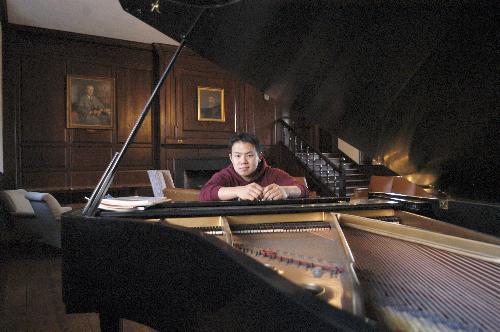
News
Summers Will Not Finish Semester of Teaching as Harvard Investigates Epstein Ties

News
Harvard College Students Report Favoring Divestment from Israel in HUA Survey

News
‘He Should Resign’: Harvard Undergrads Take Hard Line Against Summers Over Epstein Scandal

News
Harvard To Launch New Investigation Into Epstein’s Ties to Summers, Other University Affiliates

News
Harvard Students To Vote on Divestment From Israel in Inaugural HUA Election Survey
Wei-Jen Yuan

Wei-Jen Yuan ’06 started writing music for the same reason that many young men start writing music: to impress a girl.
“It was this cheesy pop song with no lyrics,” says Yuan, laughing and shaking his head. “But it didn’t really work out. The age of chivalry has come and left.”
Although Yuan’s attempt at playing Romeo fell flat, the rest of his musical career has certainly been full of success.
Born in Taiwan and relocated to Troy, New York as a child, Yuan hit the musical track early on. His mother enrolled him in a group piano lesson at age four.
He says that, like most four-year-old boys, he would have preferred to spend his childhood playing sports. Instead, he sat in a classroom stuffed with 24 other fidgety kids who, like himself, had been forced rather than enticed into piano lessons.
Though Yuan initially saw his piano-playing as “forced labor,” his perspective changed after a traumatic event at age 12.
Yuan was competing as one of six finalists at the Music Teacher National Association national finals. It was his first major competition, and he began to play his piece with confidence.
“Then half way through, I was like ‘Fuck!’” Yuan remembers. He had forgotten the rest of the piece.
“It’s the ultimate slip in music,” he says. “It’s possibly the worst thing that can happen on stage.”
Ironically, Yuan says that it was his memory slip that jolted him into realizing that piano was what he wanted to do—his ego “fell twenty stories down” after the competition.
“It was the first time I realized that if I worked really hard I could do something with music,” he says.
At 15, he enrolled in a pre-collegiate Julliard program, filling his Saturdays with piano lessons, music theory, and ear-training. He started participating in every big competition that he could find. He had conquered the little league of music, and was now looking for something bigger.
He’s been successful in that endeavor, by anyone’s estimation. Yuan has performed at venues from Carnegie Hall to Taipei’s National Music Hall. After compiling an impressive resume that boasts first place in the Haddonfield Concerto Competition, a full tuition scholarship to Julliard School of Music, and The Taiwan Youth Music Scholarship, Yuan also raked in this past year’s Harvard Radcliffe Orchestra (HRO) concerto competition. Next year, he will be carting his talents south to Yale for graduate study in music.
Ironically, Yuan’s musical commitment almost prevented him from ending up at Harvard.
He began his undergraduate years at Julliard, but then found that conservatory life wasn’t what he wanted.
“I missed the football games, I missed toilet-papering the trees and playing pranks on my friends, you know—what you do in a college town,” he says. He transferred after freshman year, and hasn’t looked back since.
But the arts-versus-everything-else question still confronts him. An Economics concentrator, Yuan has played with the idea of entering the finance world. For one, he acknowledges that the life of a concert pianist, paid on commission for each performance, does not include the perks of a steady desk job and a reliable income.
“Three years from now, if you see a cardboard box in New York, that’s going to be me,” Yuan jokes.
Then his tone turns serious. “But that’s not my concern,” he says. “If I was worried about money, I’d have taken the office route. I know that I love music so much and I have a gift for it, and I want to squeeze that out as much as I can and as long as I can until I can’t squeeze anymore.”
This summer, Yuan’s goal is to continue trying his hand at a “crapload of stuff.” He plans on improving his skill with jazz, buying a new guitar, and perhaps composing a little.
“I really don’t compose songs, but every once in a while, I get a wave of inspiration,” says Yuan. “I see a beautiful girl and I’m going to marry her, and then I compose a song for her.”
—April B. Wang
Want to keep up with breaking news? Subscribe to our email newsletter.
